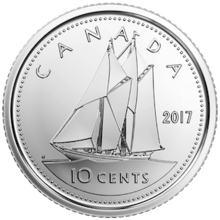Canadian dime
| Canada | |
| Value | 0.10 CAD |
|---|---|
| Mass | 1.75 g |
| Diameter | 18.03 mm |
| Thickness | 1.22 mm |
| Edge | Milled |
| Composition | 92% steel, 5.5% Cu, 2.5% Ni plating |
| Years of minting | 1858–present |
| Catalog number | - |
| Obverse | |
 |
|
| Design | Queen Elizabeth II, Queen of Canada |
| Designer | Susanna Blunt |
| Design date | 2003 |
| Reverse | |
 |
|
| Design | Bluenose schooner |
| Designer | Emmanuel Hahn; design based on a Wallace MacAskill photograph of Bluenose, not artwork of Hahn |
| Design date | 1937 |
In Canada, a dime is a coin worth ten cents. It has been the smallest Canadian coin since 1922, smaller even than the penny despite its higher face value. According to the Royal Canadian Mint, the official national term of the coin is the 10-cent piece, but in practice, the term dime predominates in English-speaking Canada. It is nearly identical in size to the American dime, but unlike its counterpart, the Canadian dime is magnetic due to a distinct metal composition: from 1968 to 1999 it was composed entirely of nickel, and since 2000 it has had a high steel content.
Currently the dime has, as with all Canadian coins, a portrait of Queen Elizabeth II on the obverse. The reverse contains a representation of the Bluenose, a famous Canadian schooner. The artist, Emmanuel Hahn, used three ships including the Bluenose as his models, so the ship design is actually a composite. The coin is produced by the Royal Canadian Mint at its facility in Winnipeg.
The word dime comes from the French word dîme, meaning "tithe" or "tenth part", from the Latin decima [pars].
2.33 g
18.034 mm
50% silver, 50% copper (70.4M)
80% silver, 20% copper (32.3M)
...
Wikipedia
